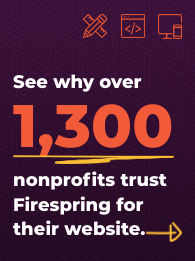Words matter. As a nonprofit organization, you understand more than most how important the words we choose are. Especially when it comes to engaging with your constituents and donors, the words you communicate can either have a significantly positive or negative impact.
Similarly the words used in your messaging, website and calls to action make a difference in whether or not constituents decide to donate. Turns out, some words—which may seem innocent enough—can be detrimental to raising money for your cause. Let’s look at these six words your nonprofit uses that drive donors away.
1. Submit
Have you ever genuinely, honestly, excitedly wanted to “submit” something? The word submit comes from the word submission, in other words yielding to someone or something. In general, human beings do not enjoy yielding. So why use the word submit for any of your marketing or website materials?
In fact, Dan Zarella and Hubspot proved just how much people hate the word submit all the way back in 2010. After examining the conversion rates from 40,000 customer landing pages, they noticed one common theme. When CTA buttons included the word “submit,” conversion rates immediately dropped by 3%. Instead of submitting a form, contact info or donation, why not have visitors stay informed or give to the cause. Check out some more valuable calls to action.
2. More Than Ever
How often has your organization used the phrase, “Your donation is needed now more than ever.” While the phrase itself might be true—in fact, during recent natural disasters, donations probably were needed more than ever—it definitely falls into the “overused” category for nonprofits. When you use the phrase “more than ever” too often, donors start to take you and your cause less seriously. Sooner than later donors will either think your organization is lying, or you’re constantly in a state of desperation. Neither of these impressions is good.
Instead, choose a different phrase which can still drive the point home, such as why their donation is specifically needed. For instance, “Your donation is needed now to provide food for people in the community,” or, “Your donation is needed now under these conditions.” Or, avoid it altogether and use it in the most sparing of circumstances.
3. Leverage
Does anyone actually know what the word “leverage” means? We hear it all the time in the nonprofit arena. Leverage means, “… to use (a quality or advantage) to obtain a desired effect or result; to exert power or influence on.” So if your nonprofit organization leverages a relationship or partnership for a specific reason, you might actually be taking advantage of or exerting power over it. It might be time to choose a different word that fits better into your brand and mission. Other examples similar to leverage that might fit better include, “utilize” or “maximize.” Be explicit in exactly what you want to say with the word leverage, so visitors and constituents can fully understand your goals.
4. Full Potential
This phrase is often used in the human services world, and can be a little tricky to navigate. It is too easy to see how all of us want our fellow human beings to reach their “full potential,” but what exactly does that mean? These words are a favorite among nonprofits because they are uncontroversial and can be applied to a variety of people or situations. However, this is exactly the danger. It is too vague. Instead, try to mix it up by choosing a more specific and insightful phrase, which really hits home to your client base. For instance, “find a safe place to call home” or “feel accepted.”
5. Impact
The word impact has had such an impact on nonprofits that they seem to only want to continue the impact elsewhere. Let’s be honest: We see “impact” everywhere, all the time in nonprofit messaging. So much so, it has lost a little bit of its, well, impact. Donors might want to have an impact on your organization, but they also might want to do other things as well, so be sure to include the vocabulary for those. Put some effort into choosing more specific, detailed words, and ease up on the impact. Other words similar to impact—but are little more unique—include ones such as “effect” or “significance.” For instance, “Help us make a beneficial mark on the community we live in.”
6. Optimize
“Optimize” tends to be a fan favorite in the nonprofit community. Literally speaking, to “optimize” something means to “… make as effective, perfect or useful as possible.” In other words, to make something the best. Sounds like a very bold claim for your nonprofit to make. And unfortunately, like so many other words on our list, “optimize” tends to be drastically overused. More appropriate words might be “improve,” “boost” or “develop.” Try branching out from general terms like “optimize,” and be very specific in the words you choose and the messages you send constituents.
The words your nonprofit uses in its messaging can have a direct result in the number of constituents who choose to donate, and how much. Do careful research before using general terms like the ones on our list, and get more specific in the exact words you want to say so that they speak to your organization in particular.
Want to learn more about how to market your nonprofit organization through valuable and engaging content? Firespring is here to help! We offer useful webinars, materials and seminars on how your NGO can market itself to further its cause. Learn more by giving us a call at 877.447.8941 or email hello@firespring.com.

